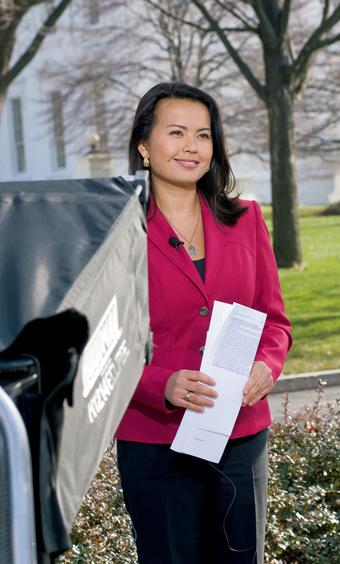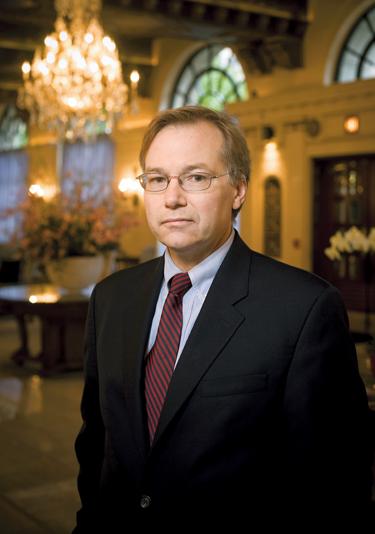Every four years since 1973, The Washingtonian has picked the city’s 50 best and most influential journalists. The original list—heavy with regional-newspaper bureau chiefs and light on television reporters—bears little resemblance to the present-day world. Since 2005 alone, the media landscape has changed dramatically.
The creative destruction brought about by the rise of the Web has accelerated: Even in major cities such as Boston, daily newspapers are hanging by a thread. Hundreds if not thousands of Washington reporters have lost their jobs as local papers have pulled back on their DC coverage. The Washington Post has 300 fewer newsroom staffers than it did in 2005.
The last four years have seen a growing disconnect between daily beat reporters and a smaller class of “impact” reporters, whose bylines may appear less frequently but who move governments, policies, and news cycles when they do write. Politico.com has built one of the few successful new journalism models around being the first with every small tidbit of news—even if its reporters don’t always get it right at first—and is causing the Post leadership some indigestion in doing so. Using a business model that values links from Drudge and cable-news hits more than Pulitzers, Politico relies on its writers to blog constantly and eschews in-depth reporting. It aims for—and hits—the inside-the-Beltway gossip crowd who can never get enough.
On the other hand, Michael Isikoff of Newsweek and Jane Mayer and Ryan Lizza of the New Yorker change the way readers see the world—even if the public sees their bylines only a handful of times a year. While beat reporting remains the heart of journalism, news-of-the-day scoops are increasingly irrelevant. Politico notwithstanding, the advent of an Internet-driven news cycle has made it matter less who beat whom to what story by ten minutes.
Looking for lasting impact? Check out journalism pieces such as the Post’s exposé about Walter Reed Army Medical Center by Dana Priest and Anne Hull, Mark Leibovich’s eviscerating New York Times Magazine profile of Chris Matthews, and virtually anything by Bob Woodward in the Post. Perhaps counterintuitively, long-form writing seems to matter more today than ever. Tom Friedman’s books have done more to shape the way business thinks about globalization—and more recently, “green” technology—than just about anything said by any corporate leader. They’ve established him as arguably Washington’s most powerful journalist.
This list, complied based on interviews with dozens of the Washington journalism establishment, is biased toward reporters who will shape our views of the Obama era. Sadly gone from the roster are a host of once-powerful correspondents for chains such as Knight Ridder and the Tribune Company, whose empires are melting away before our eyes. Underscoring that fall from grace, not a single reporter from a Tribune paper has made this list in 2009.
The list marks another milestone: Since 1973, only two reporters have made every iteration of it—David Broder and Bob Novak. That streak that comes to an end in 2009, as both men have effectively retired from day-to-day journalism. The baton is being passed to a different generation, one raised on blogs and schooled in Twitter, for whom the idea of an am-and-pm news cycle is as far removed from their reality as the telegraph.
This list includes only journalists who live in the Washington area, thereby excluding some very talented and influential writers such as Talking Points Memo’s Josh Marshall and Politico’s Ben Smith, both based in New York; People’s bureau chief, Sandra Sobieraj Westfall, a New Jersey resident whose portraits of Washington power players are read by millions; and the Post’s dwindling pool of foreign correspondents.
In alphabetical order, here are our picks for the best and most influential Washington reporters in 2009.
Mike Allen, Politico. The seemingly inexhaustible Allen writes all day, beginning with his early-morning must-read, Playbook, which is to the Obama administration what ABC’s The Note was to Washingtonians five years ago.
Marc Ambinder, Atlanti c. Thoughtful, well sourced, and unimpeachably fair, Ambinder, in his blog and magazine pieces, is the antithesis of the often-vapid cable-news talkfest.
Peter Baker, New York Times Magazine. Although he’s a Russia expert, Baker—who jumped from the Washington Post after his wife, Susan Glasser, was pushed from that paper—is a strong utility player, writing smartly on a range of topics.
Dan Balz, Washington Post. Still going, just like the Energizer Bunny, Balz continues to crisscross the country and churn out quick analysis that puts to shame many others who have more time.
Carl Cameron, Fox. Whatever you think of his network, players on both sides of the aisle trust “Campaign Carl” and know that his reporting is second to none.
Chris Cillizza, Washington Post. A blogger, vlogger, Twitterer, and reporter, Cillizza is the model of what the next generation of Washington reporter will look like.
Richard E. Cohen, National Journal. The unofficial dean of congressional correspondents—not to be confused with Washington Post columnist Richard Cohen—offers an unparalleled depth of analysis and context to his coverage.
Helene Cooper, New York Times. After covering the State Department, Cooper finds herself newly prominent with a post covering the White House and a best-selling memoir, The House at Sugar Beach: In Search of a Lost African Childhood.
Candy Crowley, CNN. Few people in TV journalism are as respected, balanced, or hard-working as “Candy,” who seems to know most campaign developments before the campaigns do.
Jeanne Cummings, Politico. In a city of lobbyists and lawyers, Cummings, a Wall Street Journal veteran, is perhaps Washington’s best expert on the business of making policy.
John Dickerson, Slate. A CBS analyst and prolific Twitterer in addition to being Slate’s chief political correspondent, Dickerson brings smarts, a sharp eye, and a dry wit to covering Washington.
Maureen Dowd, New York Times. Acerbic, sure. Yet MoDo on a bad day is still head and shoulders above some political observers on their best.
Howard Fineman, Newsweek. A force on the Web, in print, and on TV—where he appears on MSNBC and the Today show—Fineman is a strong multimedia voice.
Thomas Friedman, New York Times. While his folksy style turns off some, it makes his writing accessible to millions, and his reporting is backed up by the thousands of miles a year he travels to abide by his philosophy: “If you don’t go, you don’t know.”
Joshua Green, Atlantic. His insightful postmortem on Hillary Clinton’s failed presidential campaign underscored that Green will be a force in political reporting for the next generation.
Jan Crawford Greenburg, ABC. Covering the camera-unfriendly Supreme Court for TV is no easy task, yet Greenburg handles the task with aplomb.
David Gregory, NBC. Now filling big shoes at Meet the Press, Gregory—who made his name in combative White House press briefings under President George W. Bush—is the picture of reasoned Sunday-morning discourse.
Gwen Ifill, PBS. If you want an idea of how respected the groundbreaking Ifill is, she’s giving not one but four commencement addresses this spring.
Michael Isikoff, Newsweek. The Obama administration is quickly learning what several previous administrations know about this top investigative reporter: One of Washington’s scariest phrases is “Mike Isikoff’s calling.”
Al Kamen, Washington Post. Year after year, his pioneering In the Loop column remains the center of the government-gossip conversation.
Colbert I. King, Washington Post. The Pulitzer Prize–winning columnist cares deeply about the District and holds accountable those who seek to run it.
John King, CNN. The new face of CNN’s Sunday-morning four-hour talkfest, King is a big presence on the worldwide CNN platform.
Mark Knoller, CBS. Even the White House turns to the tireless CBS Radio dean for his meticulous records of presidential goings-on.
Howard Kurtz, Washington Post. The CNN host and Post columnist covers the shrinking media world as no one else does.
Mark Leibovich, New York Times. Why anyone agrees to be followed around by this scribe is a mystery, given that his incisive profiles lay bare a subject’s every flaw and vulnerability with a surgeon’s eye.
Alan Levin, USA Today. Business travelers around the country rely on USA Today’s aviation writer to bring them news about the industry everyone loves to hate.
Ryan Lizza, New Yorker. The top writer covering the Democratic Party today, this New Republic veteran excels in long form.
Lara Logan, CBS. Balancing globetrotting with motherhood, Logan makes her job as lead foreign correspondent look easier than it is.
Jane Mayer, New Yorker. Much of what we know about the “dark side” of the war on terror we know because of Mayer’s original, groundbreaking reporting.
Dana Milbank, Washington Post. While his humor can skew into the juvenile and often comes at the expense of the well-intentioned, Milbank’s take on Washington is always worth reading.
Andrea Mitchell, NBC. The peacock channel’s go-to reporter for just about any major Washington story—also known socially as Mrs. Alan Greenspan—is incredibly well connected.
Brody Mullins, Wall Street Journal. A rising star and an award-winning scandal breaker, Mullins represents the next generation of investigative reporter.
Adam Nagourney, New York Times. Few bylines carry the weight in politics that Nagourney’s does—and with good reason: Few match his insight, analysis, or depth of sources.
Michele Norris, NPR. A soothing voice for millions of commuters during All Things Considered, Norris always asks good questions.
Dana Priest, Washington Post. Whether the story is CIA “black sites” overseas or black mold at Walter Reed, Priest’s byline often means someone will soon be facing a congressional-oversight hearing.
Todd S. Purdum, Vanity Fair. President Clinton may have called him “sleazy,” “slimy,” and a “scumbag” after a particularly cutting piece last year, but most others would agree that Purdum writes what everyone else is thinking.
Eugene Robinson, Washington Post. With a brand-new and well-deserved Pulitzer for his campaign coverage, Robinson is relishing writing about the Obama White House in his op-ed column.
David E. Sanger, New York Times. Smart and thoughtful, Sanger is the epitome of a low-profile scribe who lets his work stand for itself.
Charlie Savage, New York Times. Savage’s work at the Boston Globe on presidential signing statements changed the way the public understood presidential power, and he’s set to extend his track record with an even larger mouthpiece at the Times.
Tom Sherwood, WRC-TV. There’s a reason Sherwood often tells the DC mayor where to stand at press conferences: Mayors come and go; Sherwood stays.
George Stephanopoulos, ABC. Given that he’s rising steadily in the ratings on Sunday mornings, Stephanopoulos’s approach to newsgathering and analysis is clearly hitting a nerve with the public.
Lynn Sweet, Chicago Sun-Times. It would be hard to find a reporter who works harder than Sweet, a one-woman multimedia newsroom who often seems to out-produce whole teams of correspondents.
Jake Tapper, ABC. The Daily Beast labeled him the “David Gregory of the Obama administration,” which, depending on your viewpoint, is a really good thing or a really bad thing—yet the sentiment that he’s “the one” who’ll hold the Obama administration accountable is unmistakable.
Chuck Todd, NBC. Todd’s savant-like knowledge of politics—now on display in the front row of the White House briefing room—has won the surprise campaign-trail star many fans and even a few adoring Web sites.
Nina Totenberg, NPR. David Souter’s retirement is only the latest scoop for the respected Supreme Court correspondent.
Karen Tumulty, Time. Even amid an otherwise dwindling publication, Tumulty’s reporting and analysis continue to make Time’s subscription price worth it—although increasingly you can find her all over the Web, too.
Amy Walter, Hotline. Tutored under master observer Charlie Cook, Walter has come into her own as a force in political analysis.
Jacob Weisberg, Slate. From the pages of the Financial Times and Newsweek to Slate, the prolific Weisberg is a keen Washington observer.
Mike Wilbon, Washington Post. Whether you’re watching him on ESPN or reading him in the Sports section, Wilbon always offers worthwhile analysis.
Bob Woodward, Washington Post. The man whose name is synonymous with “investigative reporting” has taken some hits in recent years and may not have the reach he once did, but he still manages to get inside where people want to go.
Jeff Zeleny, New York Times. No other reporter has the time or history with Barack Obama that Zeleny—a veteran of the Chicago Tribune—does, and it shows in his reporting.
>>Next: Movers and Shakers Behind the Scenes
Movers and Shakers Behind the Scenes

Some Washington names who shape the news coverage we see:
Gerard Baker, Wall Street Journal. The paper’s new deputy editor-in-chief commutes to New York from DC’s Palisades. As a London Times veteran, he’s most familiar to readers across the pond.
Dean Baquet, New York Times. The LA Times’ loss has been the gain of its Washington bureau, where Baquet now is bureau chief.
Marcus Brauchli and Katharine Weymouth, Washington Post. A generation after Ben Bradlee and Kay Graham led the Post, it’s now up to new executive editor Brauchli and publisher Weymouth—Graham’s granddaughter—to save the paper.
Bob Cohn, Atlantic. Recruited from Wired magazine, Cohn—the new editorial director of TheAtlantic.com—comes to Washington with a mandate to bring David Bradley’s magazine into the 21st century.
Thomas Edsall, Huffington Post. “Retired” from journalism, Washington Post veteran Edsall, as the Huffington Post’s political editor, is ushering in a new era of Web journalism at one of the new media’s flagship sites.
Sam Feist, CNN. The power behind CNN’s big political investment of recent years, Feist is out to prove that nonpartisan news can succeed on television.
Betsy Fischer, NBC. If it’s Sunday, as they say, it’s Meet the Press, but if it’s Meet the Press, the power player is Fischer, the longtime executive producer.
Fred Hiatt, Washington Post. As editorial-page editor, Hiatt puts together a smart selection of opinions each day.
Gerald Seib, Wall Street Journal. One of the only journalism shops still hiring is the Journal’s DC office, where executive Washington editor Seib has a mandate from Rupert Murdoch to expand political coverage.
Pete Souza, White House. An accomplished photojournalist, the new White House photographer will have a big impact on the way we view the Obama administration.
Jim VandeHei and John Harris, Politico. Individually they’re veterans of the Washington Post political team, but as “VandeHarris” they’ve morphed into the brains behind Politico.
>>Next: Rising Stars

A Dozen Rising Stars
Here are journalists to watch:
Jonathan Capehart, Washington Post. A dapper and familiar face to MSNBC viewers, editorial writer Capehart is a reasoned and interesting pundit.
Lindsay Czarniak, WRC-TV. Few local journalists seem destined for more exposure on the national stage than Channel 4’s sports anchor. The only question is where she’ll end up. ESPN? The Today show?
Yunji De Nies, ABC. For the last year, Good Morning America viewers have been rewarded with engaging reports from ABC’s new White House correspondent.
Shane Harris, National Journal. As cyber issues come to the fore, National Journal’s intelligence reporter is hot on the case with compelling narratives and scoops.
Neil Irwin, Washington Post. The Post’s go-to writer over the last year for financial stories had just returned from earning an MBA.
Anne Kornblut, Washington Post. The heir apparent to the Post’s legendary political beat, local girl Kornblut has seen her star rise fast.
Matt Labash, Weekly Standard. In the Washington magazine world, Labash—whose topics range from GOP politicos to a heart-wrenching story on the fall of Detroit—stands out as perhaps the best at the craft of writing.
Jonathan Martin, Politico. A whirling dervish publishing hot stories round the clock on his blog, Martin is one of Politico’s franchise reporters.
Mark Mazzetti, New York Times. The Times was smart to snap up Mazzetti from the ailing LA Times in 2006, and readers have been rewarded with compelling defense coverage.
Chad Pergram, Fox. A star on and off the air, Pergram has the respect of his Capitol Hill peers, not an easy bunch to please.
Alix Spiegel, NPR. Now an expert on science and social policy, Spiegel got her start on the public-radio show This American Life.
Sam Stein, Huffington Post. No less a figure than President Obama welcomed Stein into the club of White House reporters when he called on him during his first press conference.
>>Next: Journalists We Look to for Guidance

Photograph by Matthew Worden.
Good at Explaining What the News Means
Understanding what’s actually happening—or what’s really at stake—is sometimes hard. Here are a dozen of the people we look to for guidance:
David Brooks, New York Times. Brooks’s wide-ranging column topics underscore his broad interests as an earnest observer of modern life.
Steve Coll, New Yorker. His writings, whether in the magazine or in books, help explain the complex ideas and people who shape our world.
Charlie Cook, Cook Political Report. There are political junkies, and then there’s Charlie Cook—the man who knows more about everything political than anyone else.
Dahlia Lithwick, Slate. The Supreme Court, and its legal cases in general, can seem opaque until Lithwick makes it all easier to understand.
Ruth Marcus, Washington Post. Not many writers brag that they “specialize” in the federal budget, but then most writers aren’t the studious Ruth Marcus.
Steven Pearlstein, Washington Post. A longtime watcher of the financial world, Pearlstein has been a critical guide to the events of the last year.
Robert Samuelson, Newsweek. When it comes to finance and monetary policy, Samuelson knows his stuff.
Roger Simon, Politico. Past is prologue, the saying goes, and it has proved true in the anecdotes of political history that Simon brings to life.
Stuart Taylor Jr., National Journal. A brilliant legal writer, Taylor is tenacious in searching out the truth, as he did in the Duke rape case, helping to vindicate the accused students.
Evan Thomas, Newsweek. When the magazine needs someone to make sense of the world’s big events, it often turns to journalist and historian Thomas.
George Will, Washington Post. An expert on games from baseball to politics, Will is one of the best-read people in a smart city.
Adrian Wooldridge, Economist. Readers of the British magazine’s Lexington column know they can trust the viewpoint of Washington correspondent Wooldridge.
>> Next: TV and Radio Anchors We Trust
Anchors Strong and Steady
Television and radio airwaves are filled with lots of talk, and often there’s more heat than light. Here are 12 Washington anchors we trust to give it to us straight.
| Wolf Blitzer CNN | Steve Inskeep NPR | Jim Lehrer PBS | Terry Moran ABC | Chris Matthews NBC | Kojo Nnamdi WAMU |
| Norah O’Donnell NBC | Gordon Peterson WJLA | Diane Rehm WAMU | Bob Schieffer CBS | Steve Scully C-SPAN | Chris Wallace Fox |


















